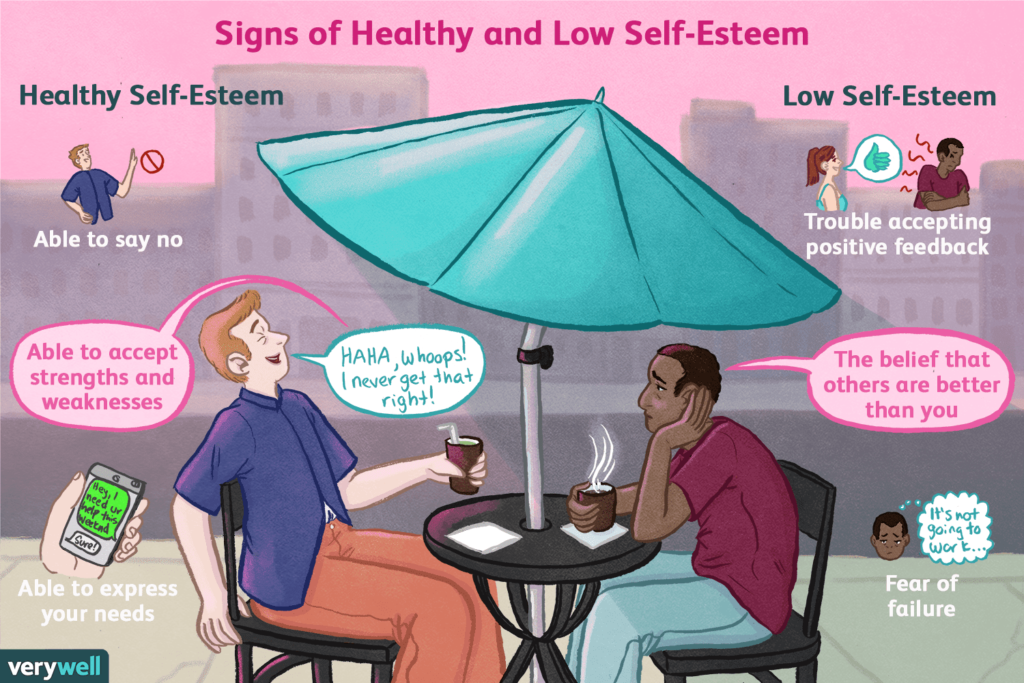The Problem with Self-Esteem
When describing mental health, the term self-esteem, and particularly low self-esteem, is generally in close proximity. However, you rarely hear about someone flaunting high self-esteem. Rather, those people have traits such as confidence or cockiness. We all have self-esteem so how do we know if our self-esteem is good or bad? I suppose it would be based on how we feel from day to day? But some days are good and some are bad, so does that mean that we have high self-esteem one week and low self-esteem the next? This post aims to explain why self-esteem is a bit futile and what we can do to replace it.

If you look it up self-esteem in the dictionary, it is defined as confidence in one’s own self-worth. Therefore, we rate ourselves on a scale. So if Max sees himself as having worth, he might rate himself as 87 out of 100 and he therefore has high self-esteem while if Rebecca sees herself as not having worth by rating herself as 14, she has low self-esteem. Makes sense. But by this logic, self-esteem creates two fallacies:
The Impossible Measurement of Self-Esteem
Firstly, self-esteem is subjective. It ignores objective reality and this can be helpful but in 9 times out of 10, it becomes unhelpful. For example, Max could be absolutely awful at tennis, but he might think he’s fantastic, which is fine. Not great when Max’s confidence brings him up against pro tennis players and he experiences adversity as a result, but still fine for his self-esteem. The real problem is when Rebecca might be one of the best tennis players in the country but still thinks that she is terrible because she has grown up with the belief that she constantly has to evaluate herself. If she’s competitive, she’s probably never good enough and so she develops low self-esteem.

Firstly, self-esteem is subjective. It ignores objective reality and this can be helpful but in 9 times out of 10, it becomes unhelpful. For example, Max could be absolutely awful at tennis, but he might think he’s fantastic, which is fine. Not great when Max’s confidence brings him up against pro tennis players and he experiences adversity as a result, but still fine for his self-esteem. The real problem is when Rebecca might be one of the best tennis players in the country but still thinks that she is terrible because she has grown up with the belief that she constantly has to evaluate herself. If she’s competitive, she’s probably never good enough and so she develops low self-esteem.
In reality, it is absolutely impossible to measure your ‘self’ because your ‘self’ is constantly changing. For example, you might have high self-esteem when you win the tennis championships on Tuesday but your self-esteem will be low when your partner breaks up with you on Wednesday. Therefore, our self-esteem is constantly changing but the problem is we don’t like to measure our self worth when it’s high. Only when it’s low.
Comparisons
The second issue with self-esteem is that in the obsession with trying to measure your self-worth, you end up comparing yourself to other people. Sarah is so much better looking than me, Tom is so much better at rugby than me, the list goes on. The problem with this is that comparison is generally upward because we’l always find someone better than us and it’s ill-favoured to compare ourselves to those worse off. Remember, high self-esteem isn’t spoken about. Therefore, Rebecca feels terrible anytime she sees Sarah and Max always feels overshadowed by Tom.

The second issue with self-esteem is that in the obsession with trying to measure your self-worth, you end up comparing yourself to other people. Sarah is so much better looking than me, Tom is so much better at rugby than me, the list goes on. The problem with this is that comparison is generally upward because we’l always find someone better than us and it’s ill-favoured to compare ourselves to those worse off. Remember, high self-esteem isn’t spoken about. Therefore, Rebecca feels terrible anytime she sees Sarah and Max always feels overshadowed by Tom.
In reality, it is impossible to compare ourselves to other people. Yes, we are all human, but the people we compare ourselves against have different genes, they had different upbringings and have completely different circumstances to you. It’s like trying to compare if pulp fiction is better than orange juice. Because it’s subjective, there is no right or wrong. Tom might be better at rugby skills, but Max is quicker and harder working. If Max tells himself that, he is cocky but if he doesn’t, he develops low self-esteem. It results in some winners, but more losers so it’s not really helpful.
Testosterone + Self-Esteem = Teenagers with Low Self-Esteem
As we hit puberty, our levels of testosterone increases and this leads to us developing social status. This means that we care about what other people think of us, similar to the apes fighting for king of the jungle. If you combine this with a society that promotes competitiveness and obsession with rating one’s self, you have the outcome of thousands of people with low self-esteem. Because self-worth is subjective, you will always have children with low self-esteem. That is the equation, but we continue to use it. And it should be noted that constant self-analysis is something that has been built into us so we cannot stop ourselves. Therefore, we need to add something that can correct the equation. Lucky for us, humanistic psychologist Carl Rodgers has just the substitute: Unconditional self acceptance.
Unconditional Self-Acceptance
Unconditional self-acceptance involves the awareness that as humans, we are biologically prone to make mistakes. This is part of the human condition and it’s an important part of normal living. Therefore, rather than basing our worth on the actions and mistakes that we make, we simply accept that we have made a mistake but this is not a reflection on our self-worth because as emphasised already, there is no benefit to having self-worth. Of course, we still set goals and try our best to achieve them but when we make a mistake, that’s ok. We continue to work towards those goals or else set new ones. Therefore, we don’t judge our worth. We instead enjoy our success and accept our failures, unconditionally.
And the word unconditionally is very important here. It’s not ok to give yourself the benefit of the doubt now and again. It needs to be consistent and because of this, unconditional self acceptance is something we have to practice. It’s easy to understand it but until you consistently accept your faults and mistakes rather than judging yourself, that is when you achieve a world without self-esteem.
Albert Ellis, founder of CBT
“The attitude of unconditional self-acceptance is probably the most important variable to long-term recovery”
In conclusion, self-esteem is outdated. Because it’s subjective, it creates a formula that results in many having low self-esteem and the promotion of unhelpful comparisons. We don’t need it. Instead, we can replace it with unconditional self-acceptance and that helps us to have greater peace of mind. Why spend our lives evaluating ourselves when we can live, make mistakes and accept those mistakes, unconditionally.
Yours Sincerely,
The Motus Movement.
PS. I think that this society of competitiveness increases the risk of low self-esteem through constant comparison but I am not against the current system. I believe that we need a competitive society in order to achieve more and give our lives meaning. The current system is far from perfect and does threaten mental health as a result but it is currently the best system that we have.
One Response